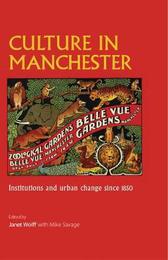
|
Culture in Manchester: Institutions and Urban Change Since 1850
Paperback / softback
Main Details
| Title |
Culture in Manchester: Institutions and Urban Change Since 1850
|
| Authors and Contributors |
Edited by Janet Wolff
|
|
With Mike Savage
|
| Physical Properties |
| Format:Paperback / softback | | Pages:224 | | Dimensions(mm): Height 234,Width 156 |
|
| Category/Genre | British and Irish History |
|---|
| ISBN/Barcode |
9781526106889
|
| Classifications | Dewey:306.0942733 |
|---|
| Audience | | General | | Tertiary Education (US: College) | | Professional & Vocational | |
|---|
| Illustrations |
27 black & white illustrations, 2 tables
|
|
Publishing Details |
| Publisher |
Manchester University Press
|
| Imprint |
Manchester University Press
|
| Publication Date |
22 August 2016 |
| Publication Country |
United Kingdom
|
Description
This book brings together studies of cultural institutions in Manchester from 1850 to the present day, giving an unprecedented account of the city's cultural evolution. These bring to light the remarkable range of Manchester's contribution to modern cultural life, including the role of art education, popular theatre, religion, pleasure gardens, clubs and societies. The chapters show the resilience and creativity of Manchester's cultural institutions since 1850, challenging any simple narrative of urban decline following the erosion of Lancashire's industrial base, at the same time illustrating the range of activities across the social classes. This book will appeal to everyone interested in the cultural life of the city of Manchester, including cultural historians, sociologists and urban geographers, as well as general readers with interests in the city. It is written by leading international authorities, including Viv Gardner, Stephen Milner, Mike Savage, Bill Williams and Janet Wolff. -- .
Author Biography
Janet Wolff is Professor Emerita of Cultural Sociology at the University of Manchester Mike Savage is Professor of Sociology at the London School of Economics -- .
Reviews'Culture in Manchester comprises nine essays which provide much evidence for the view that Manchester has not been, and is not culturally in decline. . .Most of the chapters are readable and avoid the impenetrable jargon of many essays in cultural studies.' Northern History, LI: 2, 1 September 2014 -- .
|